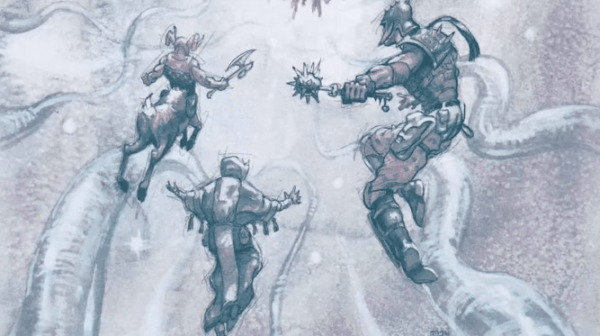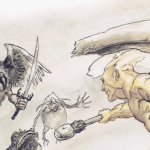At-will spells are the groundwork for almost all spellcasters within Dungeons and Dragons to begin their climb to more extraordinary powers during a campaign. These spells do not cost the player anything to cast, save for a check that may be required for the target to make or a ranged attack roll.
So, while these best At Will spells are suitable for people wanting to cast them, they are relatively weak in Combat and barely grow past what they start as, save for any changes done through feats or other options, such as Evocations from the Warlock. This list will go over the best At-Will spells, mainly consisting of Cantrips accessible in various ways, depending on the discussed spellcasting class.
12. Booming Blade
Booming Blade is a unique spell, as it is one-half of a pair of cantrips that require a weapon attack to make it useful in combat.
This spell inflicts extra thunder damage to a single weapon attack twice, Once during the initial attack, which stacks on top of the average damage and then additional damage if the target moves at least 5 feet before the end of the Caster’s next turn.
Granted, this extra damage is relatively small at 1d8 for both, and the first half of the spell does not truly activate until the player reaches their 5th level, but the potential is there.
However, there is no practical use for this spell outside of Combat since all this does add extra thunder damage to a melee attack made by the Caster and doesn’t usually aid anything that would be conducted out of combat encounters.

11. Shocking Grasp
The major bane against any spellcaster, friend, or foe is melee damage and the being that utilizes it during Combat. Primarily due to their low Health Pools and Armor Class at the start of any campaign. These spellcasters will tend to hold themselves behind the rest of the party.
They are experts at attacking at a distance and doing everything they can to prevent the hostile targets from getting close enough to them to be able to do any melee damage. As such, Shocking Grasp is an excellent spell to assist in that regard, especially if an enemy is within melee range of the Caster.
This spell grants the spell caster a melee attack through its casting and prevents the target from using their reactions until their next turn. Such an effect allows the Caster of Shocking Grasp to get away from the target without invoking an attack of opportunity from the enemy.
This guarantees a bit of distance between the spell caster and the enemy, allowing the cantrip user to survive. However, like the previous spell, Booming Blade, this spell does not have any actual uses outside of Combat. This is due to the requirement of a melee attack for the spell’s effects to work.
10. Mending
Mending can repair many things within Dungeons and Dragons, such as a broken chain link, torn clothes, and even a broken key split in two. Of course, the potential items that this spell can repair do not end there; so long as the tear itself is no bigger than a foot in any dimension of size, the mending spell can fix it as if it was never broken.
However, as stated at the beginning of this section, Mending is in the place that it is because it is completely worthless in battle. There is no practical use in a combat encounter for a player to use the mending spell unless they are doing something retroactively passive that is required to assist the party.
9. Vicious Mockery
Vicious Mockery is where the spells on this list begin to hold usefulness both within and outside Combat. Using insults and a little magic to aid the projection of said insults. A Bard can force an attacker in a combat encounter to not only take a small amount of Psychic Damage upon failure of a Wisdom Saving throw but also a disadvantage on their next attack roll before the end of its next turn.
This disadvantage makes things a little bit more difficult for an enemy to be able to land a hit against a member of the Bard’s Party, with this spell best used to help defend a spellcaster who happens to be within melee range of the enemy.
Since this spell is mainly insulted, a Bard and the Dungeon Master can collaborate to help create situations where Vicious Mockery could be used to intimidate an NPC or to try and start a Combat Encounter on the party’s terms instead of the potential enemies. Outside of this, however, is where the uses outside of combat end, simply due to how the spell functions and is used.

8. Thorn Whip
In a similar camp to Vicious Mockery, Thorn Whip is the beginning stepping stone for spells on this list that hold dual usage both within and outside of combat encounters, though Thorn Whip is capable of a little more in Combat than out of it.
The spell on its own is beneficial in redirecting targets with a little bit of piercing damage to boot, seeing as the vine spawned from this spell being cast pulls the target creature 10 feet closer to the Caster. However, this spell shines in Combat when paired with other spells that require an enemy target to be within a particular area for the spell to do anything against them.
Things such as Wall of Fire or Plant Growth can be paired with this spell to force the enemy into difficult terrain and extra damage. Still, something as simple as a cliff face can be used against the enemy, forcing them to fall off and take fall damage from their impact to the ground.
The spell could even aid a party’s melee-combat-focused members in quickly reaching a target, as they do not have to waste more time trying to get to an opponent. Of course, the uses for outside Combat are few and between, with all of them mainly about preventing people from getting away from the party for whatever reason there may be for preventing said escape.
7. Eldritch Blast
Now having Eldritch Blast in this spot in the list could be confusing for some, as right off the bat, everyone and their mother would know that Eldritch Blast is a pure combat spell meant to be used by Warlocks as a combat cantrip, and they would be right.
There is no use outside of a combat encounter that Eldritch Blast could have that would be beneficial to the party and/or not start a combat encounter within a session, whether the party wanted one or not. However, the reason for placing the spell in this spot is the versatility of Eldritch Blast through Eldritch Invocations.
Not counting Invocations added in through the introduction of Unearthed Arcana, five of these Invocations can improve the range of the Eldritch Blast spell. Push or pull an enemy to or from the Caster in a straight line, reduce the target’s movement speed by 10 feet, and add the charisma modifier of the Caster to damage upon a successful hit with the spell.
Again, the spell is useless outside of Combat except for starting fights. Still, the number of Eldritch Invocations that modify the spell allows the player to mix and match the spell to whatever use they think would be best for both their current Warlock build and the builds of the other members within the party.
6. Message
The message is a spell that people within Dungeons and Dragons are familiar with, thanks to its primary purpose and wide range of uses. Fortunately for this list, these uses provide helpful assistance in and out of combat encounters, depending on the Caster and how they choose to use it.
For example, in a combat encounter, the Caster could use the Message spell to point out changes on the battlefield that they can see, but the others in their party cannot see from where they are.
So, the Caster could point to one of their allies and inform them of this change if the party is in a situation where they need to keep their strategic choices to themselves and not vocally convey these actions to the enemy. On the opposite side of the coin, the Caster could receive some information that the rest of the party does not have.
That way, they can use this spell to distribute the intel without speaking to them, either to conceal their true purpose for why they are in an area or to not raise suspicion as to nefarious actions they may be partaking in during the campaign.

5. Light
The Sense of sight is one of the most important senses that any creature has since almost all beings within any world need to be able to use their eyes to be able to see. Of course, with the Light spell, this Sense can not only be aided by the spell but also hindered simultaneously, depending on how the spellcaster who has this within their spell list chooses to use it.
First is the apparent use of the spell, which functions as a light source for the party to travel through a darkened area, such as cave systems or abandoned mines. This light allows them to see any possible hazards within their region or enemies that could have been trying to use the darkness to jump on the party and gain a sneak attack in Combat.
Of course, some usefulness exists with this spell in battle, too, in an equally obvious way as to its use out of Combat. If this light marks a creature as the spawn point for it, then a Dungeon Master could rule that the beast that has the light on them has been blinded for the duration of the spell if they fail a Dexterity Saving Throw.
This gives the party a significant boost, as having a blinded enemy in battle gives them a chance to take that enemy out before they really knew what hit them, and in turn, it just makes Combat all the easier. So, while the Light Spell is mainly meant to help the party passively, there is a proper use for it within Combat.
4. Minor Illusion
Illusions are a common hazard within a Dungeon sometimes, as things such as traps, creatures, or other dangers could be masked and concealed. All under an illusion that makes it appear as if nothing is wrong with the area or that a being in front of the party is not at all dangerous.
Creating some of these Illusions yourself as a player can be incredibly useful to fool and confuse the enemy regardless of whether it is used during Combat or passive interaction. For example, in Combat, the spell could help distract enemies from the party to either give one allied party member a better chance of being able to hit them or try to scare them out of battle.
Thus, the combat encounter was more straightforward than it was at the start. Likewise, the spell could assist in stealth areas where a guard or a group of enemies could be distracted by a noise or physical illusion that could help the party sneak by easily.
3. Guidance
Sometimes, a player in a campaign needs extra assistance in an ability check during a situation where help could be necessary. The Guidance Spell is one such service that can boost the chances of a successful roll by adding an extra d4 to the registration to push it further.
But, of course, now the spell does the same thing and is used the same way both in and out of Combat. Still, the branching choices of usefulness mainly stem from what ability score is used by the targeted ally that spends this extra d4 to help out, giving the partner an easier chance of success.
Tip: also see the guiding bolt spell.
2. Prestidigitation
In a similar stage to some of the spells discussed previously, such as Message or Light, Prestidigitation is a cantrip meant to aid the party passively. Still, it can also be used in a fight, even if it’s better to be a passive spell. The primary reason for it being in the 2nd best spot in the list is the vast array of choices for which the Caster can use this spell, centered around a central concept of transformation and illusions.
This spell can clean up a small space, light or snuff a fire, chill or warm up consumable items, and even add a small thing that fits within the Caster’s Hand as a physical illusion. These are all good for passive points in a session, but in battle, some of these things can be used in ways that would most likely need approval from the Dungeon Master.
A few of these items could be dirtying up an enemy’s face t try and blind them, chilling or heating their weapon to make it hurt the hostile creature to hold it, or tricking an enemy into thinking the Caster has something they are after. These uses don’t necessarily have to damage the enemy fooled by the illusion. Still, they can help the party with crowd control in Combat.
1. Mage Hand
The final entry on this list, Mage Hand, is simply a third, magical hand that is just as versatile as the Caster’s own two hands. Now the Hand itself cannot damage a creature, but it can still grapple and hold a creature in place to allow someone else to attack it, or even be able to pick an item and throw it at an enemy, causing blunt damage from the item that was used by the Hand.
This Hand can also help deal with potential traps, such as opening doors or chests and triggering the trap. This clears the way for the party to progress in an area without disarming the trap through Sleight of Hand checks or Thieves’ Tools and without risking any injury to the party’s members.
Final words on best at will spells in 5e D&D
The overall conclusion of this list is that any spells that exist as a cantrip for any class to pick up has a wide variety of usage options. The player characters in a Campaign can choose these.
The only things limiting the spell’s true capabilities are the Dungeon Master’s Rulings and the Imagination of the Caster. There is no limit on how useful or worthless a spell can be in a campaign. This depends solely on what the player chooses to use spells for, regardless of whether they are in an intense battle or just relaxing in the countryside.
